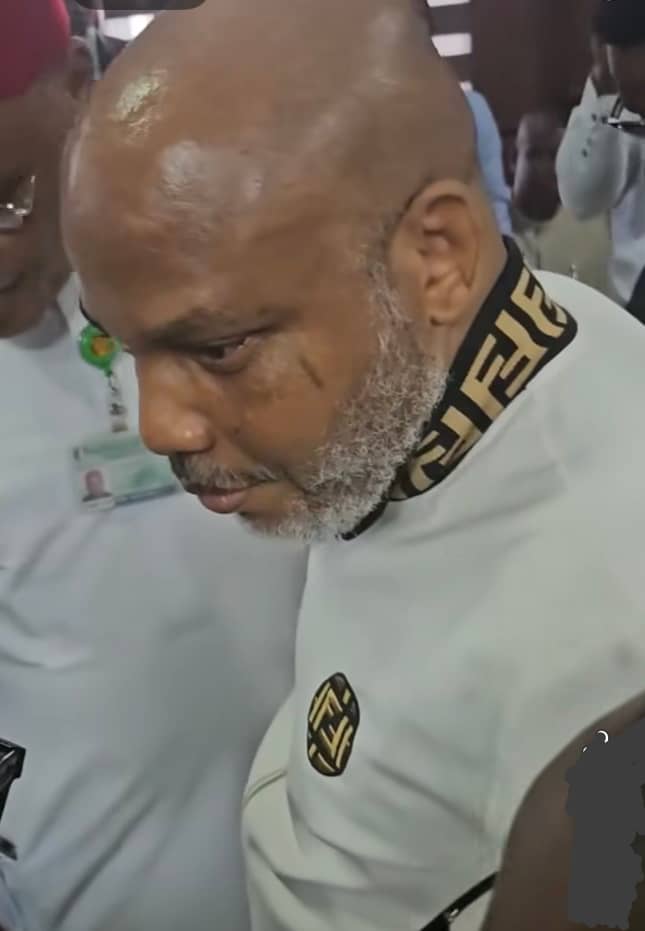Crime & Law
Nnamdi Kanu makes bold move to stop ongoing trial

Detained leader of the Indigenous People of Biafra (IPOB), Nnamdi Kanu, has filed a preliminary objection before the Federal High Court in Abuja, asking the court to dismiss or permanently halt his ongoing terrorism trial.
Kanu’s legal team argues that the Federal Government’s continued prosecution of their client is unconstitutional, alleging multiple breaches of his fundamental rights, violations of international law, and a lack of jurisdictional competence by the court.
The motion, brought under Sections 1, 35, 36, 42, 45, and 46 of the 1999 Constitution (as amended), along with several international human rights treaties, seeks a declaration that his prosecution under the repealed Terrorism (Prevention) Amendment Act 2013 is “null and void.”
According to Kanu, the repealed law cannot sustain any criminal charge since it was replaced by the Terrorism (Prevention and Prohibition) Act 2022.
He is also contesting the 2017 proscription of IPOB, describing the order as unconstitutional because it was granted ex parte, without notice or fair hearing, and contrary to a ruling by Justice Binta Nyako, who had earlier held that IPOB was not an unlawful society.
Among the reliefs sought are:
“A declaration nullifying all charges framed under repealed laws.
“A Declaration that the continued prosecution of the Defendant under the repealed Terrorism (Prevention) Amendment Act 2013, and upon a proscription order obtained ex parte and without fair hearing, violates Sections 1(3), 36(1)-(12), and 42 of the Constitution and Articles 7 and 26 of the African Charter, and is therefore null and void.
“A Declaration that the Federal High Court ex parte order proscribing IPOB, obtained without notice or hearing and while Justice Binta Nyako’s subsisting ruling (that ‘IPOB is not an unlawful society’) remained in force, [is] unconstitutional, unlawful, and cannot ground criminal liability.
“An Order striking out or permanently staying Counts 1–8 (save Count 15) of the Amended Charge dated 14 January 2022 for being barred by double jeopardy, having the same factual ingredients as Counts 6–14 earlier struck out by the Federal High Court on 8 April 2022.
“An Order declaring that the Defendant’s extraordinary rendition from Kenya without extradition proceedings or due process violated Section 36(1) & (9) of the Constitution, the Extradition Act (Cap E25 LFN 2004), and Articles 12 and 13 of the African Charter, thereby robbing this Honourable Court of jurisdiction.
“An Order nullifying all proceedings conducted in breach of the Defendant’s right to adequate facilities for defence, confidential communication with counsel, and fair hearing—particularly the eavesdropping, seizure of legal materials, and denial of unmonitored access.
“And for such further order(s) as this Honourable court may deem fit to make in the circumstance.”
Kanu further contends that his continued detention after the Court of Appeal’s October 13, 2022 judgment, which discharged him of all charges, amounts to contempt of court.
Citing the Supreme Court’s decision in Ojukwu v. Military Governor of Lagos State (1986), his defence team insists that the government, having disobeyed a binding judgment, cannot validly seek the court’s indulgence.
The motion also stresses that Kanu’s “extraordinary rendition” from Kenya in 2021, conducted outside the framework of the Extradition Act, is an illegality that nullifies the trial process.
“Jurisdiction cannot be conferred by illegality,” the defence asserts, referencing the Court of Appeal ruling in FRN v. Kanu (CA/ABJ/CR/625/2022).
Additionally, his lawyers accuse the government of surveilling confidential meetings between Kanu and his legal team, arguing that such actions breach Section 36(6)(b–d) of the Constitution, which guarantees an accused person’s right to adequate defence.
The motion, dated October 16, 2025, urges the court to strike out all defective counts, declare the prosecution unlawful, and restore Kanu to the position he was in before his rendition from Kenya.
According to the document, “AND FURTHER take Notice that at the hearing of this Preliminary Objection, the Defendant shall – in addition to the Affidavit, Exhibits and the Written Address filed hereof – rely on the following Grounds: Ground 1 Contempt and Jurisdictional Defect.
“The continued prosecution of the Defendant despite the binding Court of Appeal discharge of 13 October 2022 and eight-day post-judgment detention constitutes flagrant contempt of court. Under Ojukwu v. Military Governor of Lagos State (1986) 1 NWLR (Pt. 18) 621, a party in disobedience cannot seek the Court’s indulgence. A court cannot lawfully proceed in favour of a contemnor; jurisdiction is ousted.
“Ground 2-Void Charge under Repealed Statutes: All charges are framed under repealed laws, namely the Terrorism (Prevention) Amend Act 2013 and the Customs and Excise Management Act, both extinguished by the Terrorism (Prevention and Prohibition) Act 2022 and the Customs and Excise Management (Repeal and Re-enactment) Act 2023. Under Section 98(3) TPPA 2022, Section 36(12) CFRN and Section 122(2)(a) Evidence Act 2011, a repealed law cannot found criminal liability.
“Ground 3 – Absence of Jurisdiction Following Extraordinary Rendition: The Defendant’s kidnap and transfer from Kenya without extradition process (CA/ABJ/CR/625/2022) violated Sections 36(1), (8), and (9) CFRN. Section 76(1)(d)(ii)-(iii) TPPA 2022. and Articles 7, 12, and 13 of the African Charter. The Court of Appeal in FRN v. Kanu (CA/ABJ/CR/625/2022) held that such rendition deprives any Nigerian court of jurisdiction to try him.
“Ground 4-Continuing Violations of Fair Hearing and International Comity. The denial of fair hearing in Kenya, the breach of international comity, and the failure to restore the Defendant to the status quo ante before re-arraignment render this prosecution unconstitutional. Section 36 is non-derogable; once violated, the trial collapses. See Garba v. University of Maiduguri (1986) 1 NWLR (Pt 18) 550; Abacha v. Fawehinmi (2000) 6 NWLR (Pt 660) 228.
“Ground 5-Denial of Adequate Facilities and Void Proscription. The State’s eavesdropping on counsel-client meetings and seizure of legal materials offend Section 36(6)(b)-(d) CFRN. The ex parte proscription of IPOB-procured in defiance of Justice Nyako’s subsisting order and pending appeal to the Supreme Court-is unconstitutional. A-G Lagos v. A-G Federation (2014) 9 NWLR (Pt 1412) 217 confirms that only express appellate reversal can alter a binding judgment.”





















